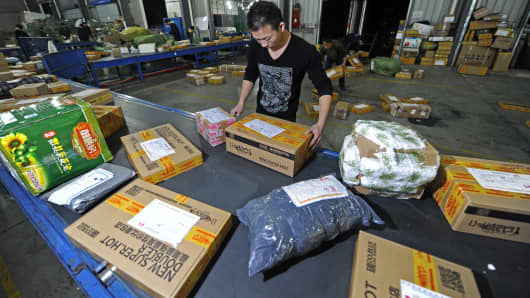Can Alibaba Knock Out Knockoffs?
Although Alibaba Group has been cracking down on vendors using its online marketplaces to sell counterfeit goods, consumers aren’t likely to be any safer after the company’s initial public offering. Counterfeiters are finding new ways of moving their goods.
Brand protection firms, which hunt down fake versions of clients’ products online, say Alibaba Group, has made big strides in recent years to change the reputation of its platforms—which include Alibaba, Taobao, Tmall and AliExpress—as hubs for counterfeit goods. “There’s no doubt in my mind that they are concerned, that they need to be seen as cleaning up their act,” said Haydn Simpson, head of brand protection at NetNames Global.

Alibaba Group did not respond to requests for comment, but the company’s Form F-1 filed with the Securities and Exchange Commission earlier this year noted among its risk factors the possibility of lawsuits or other scrutiny over listings for pirated or counterfeit goods.
“Although we have adopted measures to verify the authenticity of products sold on our marketplaces and minimize potential infringement of third-party intellectual property rights through our intellectual property infringement complaint and take-down procedures, these measures may not always be successful,” the company wrote.
In late 2012, the Office of the United States Trade Representative removed Taobao from its list of “notorious markets,” saying the site had significantly decreased sales of infringing products—an effort that has continued. A report Alibaba Group filed with the office earlier this year said Taobao had removed 114 million suspect listings in the first nine months of 2013. Over the past year, the company has announced cooperative agreements with companies including Louis Vuitton, and such groups as the International AntiCounterfeiting Coalition, the China-Britain Business Council and the Korean Intellectual Property Council, to identify and delist infringing items.
“Alibaba’s approach is very progressive, and getting better every day,” said Greg Miller, president of brand protection for OpSec Security. The investigation processes for complaints has speeded up, reducing typical response time from a week to a matter of days, he said.
Experts say it’s unlikely, however, that the measures will be enough. “It is an ever-evolving game,” Miller said. “The counterfeiters are quite creative in their approach.” Even with Alibaba Group’s escalating efforts, some NetNames Global clients still estimate that as much as 80 percent of the Taobao listings mentioning their brand are fakes, Simpson said.
Part of the difficulty for Alibaba Group in particular is scale, with more listings on their sites than both Amazon and eBay—which themselves are still battling counterfeit listings. “I have some sympathy for the Alibaba Group as to how they would police that,” Simpson said.
Lynda Talgo, vice president of global managed marketplaces at eBay, said the site’s technology has helped it cut incidence of fraud in half over the past seven years. Algorithms to spot fraud prevent many fraudulent listings from going up, she said, and having some $55 billion in site transactions covered under the “eBay Money Back Guarantee” offers added incentive to quickly remove any that do get through. “We’ve got significant investment and infrastructure and multiple level of protection,” she said.
Amazon, which did not respond to requests for comment, also offers an “A-to-Z customer guarantee” on purchases made through third-party sellers.
Although violators generally face suspensions or blocks, sellers thwarted on one infringing listing will usually simply make another, getting around site protections by creating a new account. “It is like Whac-a-Mole,” said Damian Croker, chief executive of BrandStrike Limited.
Complicating matters, counterfeiters are also increasingly expanding beyond brands’ reach. “The growing issue these days is not so much eBay and Amazon, but Facebook and other social media sites,” Croker said. “On there, people are offering product for sale, and it’s much harder to monitor, much harder to find.”
Experts say Alibaba Group and other marketplaces can take other steps to limit fraudulent listings, namely, adjusting software to automatically flag for investigation listings with certain key words (say, “replica” or frequently faked brands like Chanel or Rolex). “The question and the challenge is, where do you draw the line?” Simpson said. “They wouldn’t want to cannibalize their own marketplace by removing tens of thousands of listings every day.”
Companies are also hopeful for better coordination with marketplaces to flag and remove infringing listings. Currently, different sites have different processes and require different proofs. “The only efficient way to do it is to work collaboratively with the brands,” said Bob Barchiesi, president of the International AntiCounterfeiting Coalition. “The brands are the experts on what to look for when it comes to counterfeit goods.”

